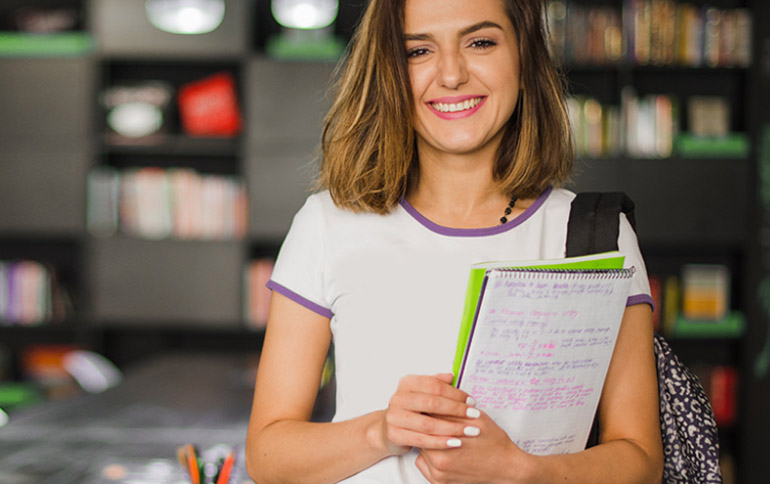From kindergarten through 12th grade, each Clonlara student learns through a personalized approach called “Full Circle Learning.” This research-supported model encourages students to formulate questions and discover answers about subjects that capture their attention, leading them to deeper understanding.
The model is inclusive and applicable to all age groups and learning styles.
Choose a topic or explore your interests. Brainstorm what you want to learn or explore. Consider your curiosities, interests, strengths, goals, challenges, passions, talents, and needs.
Pre-Search involves further exploration of the topic to fine-tune the study. Create a ‘guiding question’ that your study will focus on answering. For example: How do snowflakes form? Why do snakes shed their skin? How many stars are there? How is the Cinderella movie different from the book? How can I turn fractions into decimals and vice versa?
Research is the identification of resources, a mentor, and the amount of time to be spent on the study. It is the laying of the groundwork for the proposal, the determination of how to dig deeper into the topic and how to approach the topic/project. It also includes setting the end goal of the study.
What do you hope to discover? How will you learn about this? What resources will you use?
- People
- Places (field trips)
- Internet
- Books, etc.
The Mentor can be a parent, teacher, tutor, community member, family member, another student or an expert in the subject.
Fieldwork can include: creating, constructing, doing, reading, researching, watching, experimenting, practicing, modifying, experiencing, following assignments and/or writing about the topic. It is the step in which the student progresses from a simple knowledge base to discovery of new content or greater skill. Fieldwork may be done in any environment: a lab, a library, a trip, a classroom, or a group, for example.
The Summary is the record of the learning experience. It includes a listing of the resources used, the discoveries made, and the student’s experiences during the study. Progress Report Forms are completed by the Mentor.
The Portfolio is a completed product that shows the learning experience. It is presented in a format that best illustrates both the topic and the learning process.
The Presentation may be an exhibit, a demonstration, a performance, a speech, or a meeting with a support team to discuss the learning progress. It may be a sharing of skills and knowledge in a tutoring session. It may be completely oral, or it may include written materials and visual displays.
The Reflection process address questions such as: “What did you learn about yourself?” “What did you discover about how you learn?” “What curiosities and interests have you developed out of this experience?” “What worked and what didn’t?” This may be shared in multiple places, including the summary, portfolio, presentation and/or Progress Report.

Everyone has a personal learning journey. By choosing the program that best suits their learning needs, each Clonlara student and family can also decide where and when they want to learn. Pack your dreams and hold tight!
At Clonlara School, we believe:
Learning begins with curiosity;
Children learn best when their interests guide their activities;
Parents have the right and ability to educate their own children;
The world is our classroom, and the learning environment is integral to the learning process;
A school should allow its students to participate in the design and application of the curriculum;
Academic learning and the mastery of skills are not limited by the location in which they are sought, either in a school or at home;
Our approach to education leads to a lifelong love of learning.
Learning is an adventure, and family is a big part of it.
Clonlara teachers and advisors work closely with families to understand their goals and guide them on their learning journey. They get to know each student personally and make customized recommendations for learning activities, educational resources, and more.
Using Full Circle Learning, students and families discover how to create authentic, relevant, and personally challenging learning experiences that excite and engage.
During his last year at Clonlara, Patrick F. from Kerala, India, integrated his lifelong interests in geology, astrophysics, biology, and environmental sustainability into an ambitious culminating project in hydroponics. He began with some guiding questions: What is the history behind this method of growing? What are the benefits? Is it possible to grow inside and outside? Is sunlight important? Do the plants grow at a different rate than grown in soil?
Those questions directed his research and then eventually the construction of his own hydroponic garden. Throughout the project, Patrick learned to improvise, to use materials that were available to him, and to allow time for mistakes. He shares his work in this short video.
There are many ways to support Clonlara’s mission. Volunteer to share your time, knowledge, and experience; or donate and have a direct impact on our community.